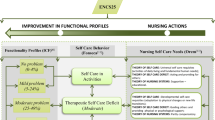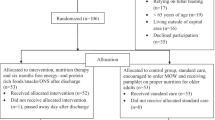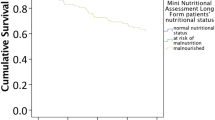Abstract
Objective:
To investigate self-care ability and sense of coherence in geriatric rehabilitation patients nutritionally screened using the Nutritional Form For the Elderly and to relate the patients' perceived health to self-care ability and sense of coherence.
Design:
Cross-sectional study.
Setting:
A geriatric rehabilitation ward in a hospital in western Sweden.
Subjects:
A sample of 172 consecutively recruited patients (65+ years) fulfilled the inclusion criteria. One hundred forty-four patients were included in the study because 16 patients refused to take part and 12 could not complete the entire data collection procedure.
Methods:
Interviews, using one instrument for nutritional screening and other instruments measuring self-care ability and sense of coherence and one question about perceived health, were performed.
Results:
Patients at medium or high risk for undernutrition had lower self-care ability (P<0.001) and weaker sense of coherence (P=0.007) than patients at low risk for undernutrition. Lower self-care ability, being single and admitted from another hospital ward was found to be predictors for being at medium or high risk for undernutrition. Patients who perceived good health had higher self-care ability (P<0.001) and stronger sense of coherence (P<0.001) than patients who perceived ill health.
Conclusions:
There is an indication that older patients at low risk for undernutrition have a greater capability to care for themselves than patients at medium or high risk for undernutrition. Perceived ill health in older patients is associated with lower self-care ability and weaker sense of coherence.
Sponsorship:
Supported by grants from The Research and Development Council Fyrbodal, Trollhättan; The Lions Research Foundation, Linköping, Sweden.
This is a preview of subscription content, access via your institution
Access options
Subscribe to this journal
Receive 12 print issues and online access
$259.00 per year
only $21.58 per issue
Buy this article
- Purchase on Springer Link
- Instant access to full article PDF
Prices may be subject to local taxes which are calculated during checkout
Similar content being viewed by others
References
Ageborg M, Allenius B-L, Cederfjäll C (2005). Quality of life, self-care ability, and sense of coherence in hemodialysis patients: A comparative study. Hemodial Int 9, S8–S14.
Altman D (1999). Practical Statistics for Medical Research. Chapman & Hall/CRC: London.
Antonovsky A (1987). Unraveling the Mystery of Health, 1st edn Jossey-Bass Inc., Publishers: San Francisco.
Antonovsky A (1991). Hälsans Mysterium (in Swedish, Unraveling the Mystery of Health). Natur och Kultur: Stockholm.
Antonovsky A (1993). The structure and properties of the sense of coherence scale. Soc Sci Med 36, 725–733.
Avlund K, Holstein BE (1998). Functional ability among elderly people in three service settings: the discriminatory power of a new functional ability scale. Eur J Epidemiol 14, 783–790.
Bachrach-Lindström MA, Ek A-C, Unosson M (2000). Nutritional state and functional capacity among elderly Swedish people with acute hip fracture. Scand J Caring Sci 14, 268–274.
Brantervik ÅM, Jacobsson IE, Grimby A, Wallén TCE, Bosaeus IG (2005). Older hospitalised patients at risk of malnutrition: correlation with quality of life, aid from social welfare system and length of stay? Age Ageing 34, 444–449.
Covinsky KE, Martin GE, Beyth RJ, Justice AC, Sehgal AR, Landefeld CS (1999). The relationship between clinical assessments of nutritional status and adverse outcomes in older hospitalized medical patients. J Am Geriatr Soc 47, 532–538.
Ekman I, Fagerberg B, Lundman B (2002). Health-related quality of life and sense of coherence among elderly patients with severe chronic heart failure in comparison with healthy controls. Heart Lung 31, 94–101.
Eriksson M, Lindström B (2005). Validity of Antonovsky's sense of coherence scale: a systematic review. J Epidemiol Community Health 59, 460–466.
Fletcher RW, Fletcher SW (2005). Clinical Epidemiology - The Essentials, 4th edn Lippincott Williams & Wilkins: Philadelphia, PA.
Gazzotti C, Albert A, Pepinster A, Petermans J (2000). Clinical usefulness of the mini nutritional assessment (MNA) scale in geriatric medicine. J Nutr Health Aging 4, 176–181.
Gazzotti C, Arnaud-Battandier F, Parello M, Farine S, Seidel L, Albert A et al. (2003). Prevention of malnutrition in older people during and after hospitalisation: results from a randomised controlled clinical trial. Age Aging 32, 321–325.
Guigoz Y, Vellas B, Garry PJ (1996). Assessing the nutritional status of the elderly: the mini nutritional assessment as part of the geriatric evaluation. Nutr Rev 54, S59–S65.
Gustafsson K, Sidenvall B (2002). Food-related health perceptions and food habits among older women. J Adv Nurs 39, 164–173.
Gustafsson K, Andersson J, Andersson I, Nydahl M, Sjödén P-O, Sidenvall B (2002). Associations between perceived cooking ability, dietary intake and meal patterns among older women. Scand J Nutr 46, 31–39.
Haveman-Nies A, de Groot LCPGM, van Staveren W (2003). Relation of dietary quality, physical activity, and smoking habits to 10-year changes in health status in older Europeans in the SENECA study. Am J Public Health 93, 318–323.
Holmgren L, Söderhamn O (2005). Perceived health and well-being in a group of physically active older Swedish people. Vård i Norden/Nordic Journal of Nursing Research and Clinical Studies 25, 39–42.
Johnson M (2004). Approaching the salutogenesis of sense of coherence: the role of ‘active’ self-esteem and coping. Br J Health Psychol 9, 419–432.
Kondrup J, Allison SP, Elia M, Vellas B, Plauth M (2003). ESPEN guidelines for nutrition screening 2002. Clin Nutr 22, 415–421.
Kyle UG, Kossovsky MP, Karsegard VL, Pichard C (2006). Comparison of tools for nutritional assessment and screening at hospital admission: a population study. Clin Nutr 25, 409–417.
Langius A, Björvell H (1993). Coping ability and functional status in a Swedish population sample. Scand J Caring Sci 7, 3–10.
Langius A, Björvell H, Antonovsky A (1992). The sense of coherence concept and its relation to personality traits in Swedish samples. Scand J Caring Sci 6, 165–171.
Lee Y (2000). The predictive value of self assessed general, physical, and mental health on functional decline and mortality in older adults. J Epidemiol Community Health 54, 123–129.
Margetts BM, Thompson RL, Elia M, Jackson AA (2003). Prevalence of risk of undernutrition is associated with poor health status in older people in the UK. Eur J Clin Nutr 57, 69–74.
Orem DE (1995). Nursing Concepts of Practice 5th edn Mosby, Inc: St. Louis.
Orem DE (2001). Nursing Concepts of Practice 6th edn Mosby, Inc: St. Louis.
Ödlund Olin A, Armyr I, Soop M, Jerström S, Classon I, Cederholm T et al. (2003). Energy-dense meals improve energy intake in elderly residents in a nursing home. Clin Nutr 22, 125–131.
Ödlund Olin A, Koochek A, Ljungqvist O, Cederholm T (2005). Nutritional status, well-being and functional ability in frail elderly service flat residents. Eur J Clin Nutr 59, 263–270.
Pearson JM, Schlettwein-Gsell D, Brzozowska A, van Staveren WA, Bjørnsbo K (2001). Life style characteristics associated with nutritional risk in elderly subjects aged 80-85 years. J Nutr Health Aging 5, 278–283.
Poulsen I (2005). Functional and Nutritional Assessments in Geriatric Rehabilitation. A Feasibility Study. Dissertation. Department of Nursing, Faculty of Medicine. Lund University: Lund, Sweden.
Pörn I (1984). An Equilibrium Model of Health. In: Nordenfelt L and Lindahl BIB (eds). Health, Disease and Causal Explanations in Medicine. D. Reidel Publishing Company: Dordrecht. pp. 3–9.
Pörn I (1993). Health and adaptedness. Theor Med 14, 295–303.
Rasmussen HH, Kondrup J, Staun M, Ladefoged K, Kristensen H, Wengler A (2004). Prevalence of patients at nutritional risk in Danish hospitals. Clin Nutr 23, 1009–1015.
Schneider G, Driesch G, Kruse A, Wachter M, Nehen H-G, Heuft G (2004). What influences self-perception of health in the elderly? The role of objective health condition, subjective well-being and sense of coherence. Arch Gerontol Geriatr 39, 227–237.
Stratton RJ, King CL, Stroud MA, Jackson AA, Elia M (2006). (Malnutrition universal screening tool) predicts mortality and length of hospital stay in acutely ill elderly. Br J Nutr 95, 325–330.
Svensson E (2001). Guidelines to statistical evaluation of data from rating scales and questionnaires. J Rehab Med 33, 47–48.
Söderhamn O (2000). Self-care activity as a structure: a phenomenological approach. Scand J Occup Ther 7, 183–189.
Söderhamn U (2006). Nutritional screening of older patients. Developing, testing and using the Nutritional Form For the Elderly (NUFFE). Dissertation. Department of Medicine and Care, Division of Nursing Science, Faculty of Health Sciences. Linköping University: Linköping, Sweden.
Söderhamn O, Ek A-C, Pörn I (1996a). The self-care ability scale for the elderly. Scand J Occup Ther 3, 69–78.
Söderhamn O, Holmgren L (2004). Testing Antonovsky's sense of coherence (SOC) scale among Swedish physically active older people. Scand J Psychol 45, 215–221.
Söderhamn O, Lindencrona C, Ek A-C (1996b). Validity of two self-care instruments for the elderly. Scand J Occup Ther 3, 172–179.
Söderhamn O, Lindencrona C, Ek A-C (2000). Ability for self-care among home dwelling elderly people in a health district in Sweden. Int J Nurs Stud 37, 361–368.
Söderhamn U, Söderhamn O (2001). Developing and testing the nutritional form for the elderly. Int J Nurs Pract 7, 336–341.
Söderhamn U, Söderhamn O (2002). Reliability and validity of the nutritional form for the elderly (NUFFE). J Adv Nurs 37, 28–34.
Westergren A, Unosson M, Ohlsson O, Lorefält B, Hallberg IR (2002). Eating difficulties, assisted eating and nutritional status in elderly (⩾65 years) patients in hospital rehabilitation. Int J Nurs Stud 39, 341–351.
Acknowledgements
We express our gratitude to the patients and staff at the ward where the study was carried out. We thank Ms Judith Rinker, who revised the English. The study was supported by grants from The Research and Development Council Fyrbodal, Trollhättan, Sweden, and The Lions Research Foundation, Linköping, Sweden.
Author information
Authors and Affiliations
Corresponding author
Additional information
Guarantor: U Söderhamn. Contributors:All authors contributed to the study design. US performed the data collection and outlined the first data analyses and the paper drafting. All authors were engaged in the final data analyses and paper writing.
Rights and permissions
About this article
Cite this article
Söderhamn, U., Bachrach-Lindström, M. & Ek, AC. Self-care ability and sense of coherence in older nutritional at-risk patients. Eur J Clin Nutr 62, 96–103 (2008). https://doi.org/10.1038/sj.ejcn.1602691
Received:
Revised:
Accepted:
Published:
Issue Date:
DOI: https://doi.org/10.1038/sj.ejcn.1602691



